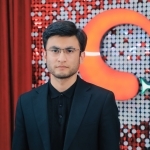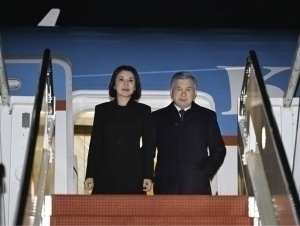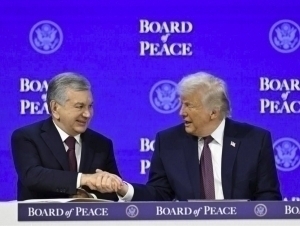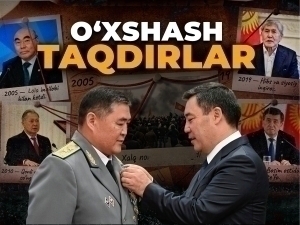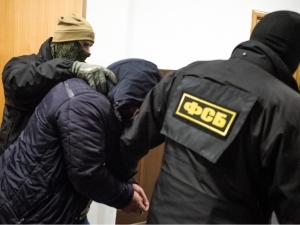Middle corridor, Middle East crises, and the murder that shocked Sweden — Weekly digest
Review
−
01 February 2025 14087 14 minutes
The global political landscape is shifting as nationalist movements gain momentum across major powers. The United States and Germany are at the forefront of a hardening stance on migration, raising concerns about the growing influence of right-wing forces. Meanwhile, in a shocking event, the notorious Quran-burning provocateur met his demise, adding further controversy to the international discourse on extremism and freedom of expression.
Nationalists Are “Saddling the Horse”: A Return to Nazism?
The United States has entered a new phase of strict deportation policies, with former President Donald Trump announcing plans to send 30,000 undocumented immigrants—deemed security threats—to Guantanamo Bay. This move marks a significant escalation in immigration enforcement, as Trump signed an executive order directing the Departments of Defense and Homeland Security to prepare the detention center to accommodate the new arrivals.
Guantanamo Bay, infamous for its role in the post-9/11 war on terror, has long been associated with human rights abuses. Originally a naval base, it was converted into a high-security detention facility in 2002 to house terrorism suspects. Over the years, 780 individuals from 48 countries have been held there, with 756 later transferred to other locations. Reports indicate that nine detainees have died in custody, and only 15 remain in the facility today. The prospect of using this controversial prison to detain migrants has sparked global outrage, with critics calling it an extreme and inhumane approach to border security.
Trump’s immigration crackdown has triggered an international backlash. Colombian President Gustavo Petro condemned the policy, likening it to historical practices of “white slavery.” His remarks came after U.S. authorities forcibly deported dozens of Colombians on military flights, treating them as criminals. Meanwhile, concerns about Trump’s nationalist agenda have been amplified by Elon Musk’s recent public behavior, including his use of a Nazi-associated gesture, further fueling speculation about ideological shifts within the U.S. political elite.
The restrictive immigration policies seen in the U.S. are now influencing European politics, particularly in Germany. In a historic move, the German Bundestag passed a resolution to significantly tighten migration laws, a decision driven by the rising influence of right-wing forces. The initiative, led by the Christian Democratic Union/Christian Social Union (CDU/CSU) bloc, calls for permanent border controls, the rejection of asylum seekers at entry points, and the detention of migrants facing deportation.
This policy shift comes in response to recent violent crimes involving immigrants. On January 22, a 28-year-old Afghan man without a valid residence permit carried out a deadly knife attack in Aschaffenburg, killing a two-year-old boy and a 41-year-old man while injuring three others. A month earlier, a Saudi Arabian refugee drove a vehicle into a crowded Christmas market in Magdeburg, killing five people and injuring over 200. These incidents have intensified demands for stricter border controls and immigration enforcement.
However, the most alarming development is the growing collaboration between mainstream conservative parties and the far-right. The Bundestag resolution passed with 348 votes in favor, 345 against, and 10 abstentions—marking the first time nationalist and ultra-right factions played a decisive role in shaping German policy. Former Chancellor Angela Merkel strongly criticized CDU leader Friedrich Merz for accepting support from the far-right Alternative for Germany (AfD) party, calling it an unprecedented moment in German politics.
The global media has treated this event as a political milestone, signaling that nationalist sentiment is no longer confined to fringe movements but is increasingly influencing mainstream governance. The resurgence of nationalism in Germany is part of a broader trend, as similar movements gain ground across Europe. Italy, where fascism first emerged, is now governed by nationalist forces, while France and the Netherlands are also witnessing the rise of far-right movements advocating for strict immigration policies.
The political shifts in the U.S. and Germany highlight a broader global trend: nationalist ideologies are gaining traction at an unprecedented rate. With Trump reinforcing nationalist rhetoric in the U.S. and German opposition leader Friedrich Merz aligning with the far-right, a significant transformation in global governance appears to be underway.
As these developments unfold, the critical question remains: Is this a temporary political cycle, or are we witnessing a fundamental shift in international politics? The coming months will determine how deeply entrenched nationalist forces will become in shaping the policies of major world powers.
Jolani Assumes Presidency as Syria Embarks on Radical Reconstruction
On January 29, the head of the Syrian administration, who emerged as a dominant figure in the political landscape of 2024, was officially declared the country’s interim president. The new Syrian government promptly announced the abolition of the previous constitution, the dissolution of parliament, and the disbandment of all security services and armed formations.
Jolani outlined the immediate priorities for Syria’s transition, emphasizing the need to fill the power vacuum, maintain civil stability, establish functioning state institutions, lay the foundation for economic recovery, and restore Syria’s standing on both the regional and international stage. With the 2012 constitution now void, it was determined that Jolani’s presidential authority would remain in effect until a new constitution was adopted. Additionally, the government nullified several laws enacted under former President Bashar al-Assad. December 8 was officially designated as the day commemorating the victory of the "Great Syrian Revolution." In a further break from the past, the ruling Ba'ath Party, which had controlled Syria since 1963, was dissolved, with a prohibition on its reformation under any new name.
The sweeping transformations extend beyond political and institutional reforms to symbolic and national attributes. Notably, Syria’s national emblem and identity documents are set to be redesigned. A group of 50 volunteers, led by Muhammad Selwaye, founder of the branding and marketing firm Mpire Agency, has taken on the task of overhauling Syria’s identity cards, passports, official documents, and national insignia. The initiative also includes revising the design of the country’s currency and government symbols. The volunteer team, composed of historians, researchers, and scientists, is expected to complete the project within three to four months. To maintain confidentiality, all participants have signed non-disclosure agreements.
One of the earliest state symbols to be changed was the national flag. Shortly after Sharo assumed leadership, Syria’s old flag was replaced with a new green-striped design. The updated flag was first raised at the Syrian embassy in Berlin and subsequently hoisted at the embassy in Paris.
Amidst these sweeping domestic changes, Syria has also begun reestablishing diplomatic ties. The first foreign leader to visit the country under the new administration was Qatar’s Emir, Tamim bin Hamad Al Thani. Many had anticipated that Turkish President Recep Tayyip Erdoğan would be the first international figure to arrive in Damascus, but the Emir of Qatar dismissed such expectations.
Historically, relations between Qatar and the Assad regime had been strained, particularly after Doha was accused of supporting armed opposition groups in southeastern Syria during the civil war. This led to a breakdown in diplomatic relations and the collapse of the Qatar-Turkey gas pipeline project, which had been planned to traverse Syrian territory. However, following Assad’s removal, Qatar swiftly reopened its embassy in Damascus, shortly after Ankara took similar steps.
Despite the rapid pace of Syria’s reconstruction and reintegration into the global community, significant challenges remain due to the deep-seated issues inherited from the Assad era. Jolani’s administration faces a formidable list of priorities, including forming a new government by March, transitioning from an "appointed" president to an "elected" one, and drafting a new constitution. Jolani has proposed a four-year timeline for presidential elections and a three-year process for rewriting the constitution.
However, these political reforms pale in comparison to Syria’s most pressing challenge—unifying the country’s fragmented territories under a single authority. Nearly a third of Syria remains under Kurdish control, backed by the United States. In the north, the Turkish-supported Syrian National Liberation Army (SNA) dominates, while in the southeast, armed groups financed by Arab states hold sway.
The Kurdish question is particularly sensitive. As the transitional government seeks to consolidate its authority, it is engaged in negotiations with the Kurdish forces operating under the U.S.-backed Syrian Democratic Forces (SDF). Details of the discussions remain undisclosed, but it is widely known that Kurdish factions are pushing for independent status within Syria’s future 300,000-strong army, which is set to be established over the coming years. Given Turkey’s role as the primary architect of this new military force, Kurdish demands appear unlikely to succeed.
Adding to the complexity, Ankara has signaled its intent to launch a large-scale military operation against Kurdish groups, which it considers a primary security threat. Turkish officials have repeatedly warned that unless Kurdish militias withdraw, Turkey will take all necessary measures to eliminate their presence. This looming military confrontation underscores the immense diplomatic and strategic hurdles Jolani’s administration must navigate to prevent further escalation of conflict on Syrian soil.
The road ahead for Syria remains uncertain. While the interim government has made swift and decisive moves to reshape the country’s political, legal, and national identity, the challenge of securing territorial integrity and preventing new conflicts will test Jolani’s leadership in the months and years to come.
Syria Calls on Russia to “Wash Away Old Guilts”
On January 28, a Russian delegation visited Damascus for the first time since Syria’s change of leadership. During the visit, Russian representatives held discussions with members of the new Syrian government. Kremlin spokesperson Dmitry Peskov provided a brief statement about the talks but refrained from addressing reports that Syrian officials had demanded Russia extradite former President Bashar al-Assad and compensate Syria for years of Russian military operations on its soil.
According to Reuters, during a meeting with Russian officials, Syria’s new leader, Ahmed al-Sharo, called for the extradition of Assad, along with compensation for Russia’s involvement in Syria’s civil war. In parallel, Russia sought to maintain its two military bases in Syria during the negotiations. While Moscow expressed support for the recent political changes in Syria, the new government emphasized that rebuilding relations with Russia must involve an acknowledgment of past mistakes, a commitment to respecting the will of the Syrian people, and a dedication to serving their interests.
Georgia Pressures Syria to Reverse Assad-Era Decisions
While Syria pushes demands onto Russia, Georgia has also seized the moment to present its own requests. Four major opposition parties in Georgia have appealed to President Ahmed al-Sharo, urging him to revoke Syria’s recognition of Abkhazia and South Ossetia—two Georgian territories occupied by Russia and declared "independent" under the Assad regime.
These breakaway regions remain internationally unrecognized, except by a handful of states—Russia, Venezuela, Nicaragua, and Assad’s Syria. In 2018, facing diplomatic isolation and heavily reliant on Moscow and Tehran, Assad’s government recognized Abkhazia and South Ossetia, a move widely seen as an act of submission to Russian influence. Now, Georgian opposition parties are calling on Syria’s new leadership to reconsider this stance and align with international norms.
However, the absence of any such appeal from Georgia’s ruling party, Georgian Dream, has raised concerns. Critics argue that the Georgian government, unofficially guided by billionaire Bidzina Ivanishvili, has failed to act decisively, allowing the opposition to take the lead in challenging Russian influence. This hesitation has only reinforced suspicions that the current Georgian leadership remains politically constrained by Moscow.
Tashkent-Ankara-Baku Trilateral Meeting: Strengthening Regional Connectivity
On January 29, the second trilateral meeting of the Ministers of Foreign Affairs, Trade, Economy, and Transport of Azerbaijan, Turkey, and Uzbekistan was held in Ankara, Turkey, where the parties signed the final declaration. The document outlines an Action Plan aimed at enhancing cooperation in transport and regional communications while addressing key geopolitical and economic issues.
The declaration includes several notable provisions:
- Strengthening joint efforts to counter attempts that threaten sovereignty and territorial integrity.
- Enhancing the efficiency and competitiveness of the Middle Corridor, a key trade route connecting China to Europe via Central Asia and the Caucasus.
- Welcoming the announced ceasefire in Gaza, urging its strict implementation, and reaffirming support for a two-state solution to the Israeli-Palestinian conflict.
- Backing Azerbaijan’s reconstruction and demining efforts in Karabakh and East Zangezur.
Speaking at the joint press conference following the meeting, Uzbek Foreign Minister Bakhtiyor Saidov emphasized that the Trans-Afghan Railway would be an integral part of the global supply chain. He highlighted discussions among Kyrgyzstan, Uzbekistan, Turkmenistan, Azerbaijan, Georgia, Turkey, and European nations on boosting cargo transportation through the region’s extensive multimodal freight corridors.
The main focus of the trilateral talks was transport infrastructure and corridor development. A crucial route of shared interest among Turkey, Azerbaijan, and Uzbekistan is the Middle Corridor, which has gained strategic importance since Russia’s invasion of Ukraine.
Following the Soviet Union’s collapse in 1991, Central Asia and the South Caucasus regained their historical roles as intermediaries in global trade. In 2013, Azerbaijan, Georgia, and Kazakhstan took initial steps to modernize the region’s trade infrastructure, laying the groundwork for the Middle Corridor. Since 2022, cargo traffic along this route has surged, largely due to Western sanctions on Russia, which have significantly reduced the viability of the traditional Russia-Belarus transit route.
Compared to alternative trade routes, the Middle Corridor offers distinct advantages:
- It is faster than maritime transport via the Suez Canal.
- It provides a land-based alternative to existing global supply chains.
However, the route also faces challenges. One of the primary concerns is the declining water level of the Caspian Sea, which could impact shipping efficiency and cargo capacity. Addressing these logistical barriers will be crucial for ensuring the long-term viability of the Middle Corridor as a leading Eurasian trade route.
The Last Moments of Salwan Momika
On January 29, Salwan Momika, an Iraqi man infamous for desecrating the Holy Quran in Sweden, was shot dead at his home in Södertälje, a suburb of Stockholm. Reuters reported that police and ambulances were dispatched to the Hovsjö district following a shooting incident shortly after 11 p.m. Swedish media later confirmed that the victim was Momika, who was live-streaming on TikTok at the time of his murder. The Swedish Security Police have launched an investigation into the killing.
Momika, 38, gained global notoriety in 2023 for publicly burning copies of the Quran in protests against Islam, actions that were widely condemned and triggered a severe diplomatic backlash. His demonstrations, facilitated by Swedish authorities under the pretext of freedom of expression, sparked outrage in the Muslim world, leading to violent protests, attacks on Swedish embassies, and the expulsion of the Swedish ambassador from Iraq. The government of Baghdad demanded his extradition, while local authorities in his hometown of Al-Kufa placed a $2 million bounty and offered a Quran made of two kilograms of gold to anyone who would kill him.
The global condemnation of Momika’s actions came from figures such as U.S. and EU officials, Pope Francis, and Uzbek President Shavkat Mirziyoyev. The backlash also escalated Sweden’s internal security crisis, prompting its Security Police to raise the national terrorist threat level from three to four on a five-point scale in August 2023.
Momika first arrived in Sweden in 2018 and had his residence permit revoked in 2023. After unsuccessfully seeking asylum in Norway, he was sent back to Sweden, where he was granted temporary residency in 2024 on the grounds that returning to Iraq would put him at risk of torture. In August 2024, he was charged in Sweden with incitement against an ethnic group, and a ruling on his case was expected on January 30, 2025. However, following his murder, the Stockholm District Court has postponed its decision until February 3, 2025, citing the need for additional legal considerations.
According to Swedish radio reports, five individuals have been arrested on suspicion of involvement in Momika’s murder. His death marks the end of a life defined by controversial acts that many saw as provocations, and it has reignited debates over the boundaries between free speech, religious respect, and national security.
Live
All